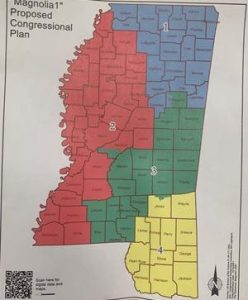The U.S. Supreme Court dismissed an appeal earlier this week that would have revisited the ongoing Buck v. Reeves case, denying those in opposition the ability to argue in court that the state’s new congressional district lines are racially gerrymandered.
The Mississippi legislature opted to use district lines drawn by a three-person court after the state was reduced to four congressional seats following the 2000 census. In turn, the court-determined lines were used for all congressional and primary elections until the next census was released in 2010.

One year after the 2010 census, the same court amended its previous judgement from 2002 to allow for the district lines to be redrawn to fit the changes in population. The Mississippi legislature decided to use the court-issued districts for another decade before the next census was released.
In 2020, the census showed that Mississippi’s district lines were malapportioned once again and needed to be redrawn. On Jan. 24, 2022, Reeves signed House Bill 384, making it the first time in over two decades that the state legislature decided to draw its own district lines. As a result, the three-person panel was not required to draw new district lines for the state.

The same day, the Mississippi Republican Party Executive Committee (MREC) filed a motion to vacate the court’s previous judgement from 2011 so that lines can officially be redrawn.
Officials including Governor Tate Reeves, the secretary of state, the attorney general, and two other individual voters argued that the new districts accurately represented the finding from the new 2020 census.
The Mississippi Democratic Party Executive Committee (MDEC) disagreed with the new lines, however, as they believed the bill was racially gerrymandered. The MDEC also argued that the new districts were not precleared under Section 5 of the Voting Rights Act of 1965 like all the other lines were, leading the lines to be invalid.
Despite the MDEC’s claims, the 2011 judgement was vacated by the court as the decision from Shelby County v. Holder made it so that the legislature did not have to get the new district lines precleared prior to passing HB 384.
Although the court verified that it was within the legislature’s rights to name the new district lines without preclearance, the accusations that the districts were racially gerrymandered were not addressed.
As a result, the Buck v. Reeves case was introduced when those opposing the decision appealed the court’s orders to the U.S. Supreme Court.
Plaintiffs involved in the case asked the Supreme Court to reverse the three-person panel’s decision in order to revert the state’s lines to what was designated in 2011. Instead, the Supreme Court dismissed the appeal on Tuesday,
“The Supreme Court did not say that they disagree with that claim. What they said this week was, ‘We’re not going to hear this case in this setting,'” Christopher Green, a law professor at the University of Mississippi Law School, stated. “They might be open to that kind of claim in a future case. We don’t really have any information about the receptivity of the court to that kind of claim.”
Green added that members of the three-person court have previously said that they would be in support of the case if it were presented in the right setting.
“Judge Bramlette said, ‘You know, I think this claim might have some merit in a different posture,'” Green explained. “There’s definitely some support among the courts that this plan is worth looking at, just not in this posture.”
Continue watching the full interview below.







